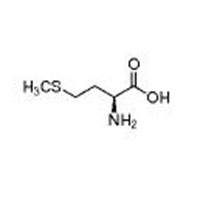Synonyms
S-methionine
MFCD00063097
(S)-2-amino-4-(methylthio)-Butanoic acid
EINECS 200-562-9
L-α-Amino-γ-methylmercaptobutyric acid
Methionine (VAN)
(L)-Methionine
Met-bNA
2-Amino-4-methylthiobutanoic acid (S)-
L-a-Amino-g-methylmercaptobutyric Acid
Methionine, L- (8CI)
(2S)-2-amino-4-(methylsulfanyl)butanoic acid
Product Description
L-Methionine is an essential amino acid that is widely used in the chemical and food industries. It is
an important component of proteins and is necessary for the growth and repair of tissues in the
body.
In the chemical industry, L-methionine is primarily used as a precursor to the production of other
important chemicals, including cysteine, taurine, and methionine sulfoximine. It is also used as a
chelating agent, which can help to remove heavy metals from wastewater and other industrial
processes.
In the food industry, L-methionine is used as a dietary supplement and as a food additive to fortify
certain foods with this important nutrient. It is commonly used in animal feed to improve growth and
muscle development in livestock and poultry.
When used as a food ingredient, L-methionine must meet certain purity and safety standards to ensure
that it is safe for human consumption. As a food-grade ingredient, it is typically produced through
fermentation of natural sources, including vegetable proteins and molasses.
The benefits of using L-methionine as a dietary supplement include its ability to support protein
synthesis, promote healthy hair, skin, and nails, and support overall immune function. It is also
important for the production of important molecules in the body, including glutathione, which is a
powerful antioxidant.
In addition to its use as a dietary supplement, L-methionine has also been studied for its potential
health benefits in certain medical conditions, including liver disease and Parkinson's disease. However,
further research is needed to fully understand these potential benefits.
Overall, L-methionine is an important and versatile ingredient in both the chemical and food industries.
Its ability to support protein synthesis and overall health make it an important dietary supplement,
while its use in animal feed can help to improve growth and muscle development in livestock and
poultry.





